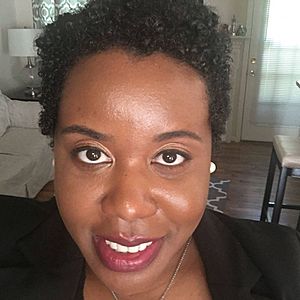Lynnae Quick facts for kids
Quick facts for kids
Lynnae C. Quick
|
|
|---|---|
 |
|
| Born |
Greensboro, NC, United States
|
| Alma mater | North Carolina Agricultural and Technical State University, BS The Catholic University of America, MS Johns Hopkins University, MA, PhD |
| Scientific career | |
| Fields | Planetary science |
| Institutions | Goddard Space Flight Center |
| Thesis | Europa: Cryomagmatic Processes & Cryovolcanic Surface Expressions |
| Academic advisors | Bruce D. Marsh, Louise Prockter |
Lynnae C. Quick is an amazing American scientist. She studies planets and moons at NASA's Goddard Space Flight Center. Her job is to understand "ocean worlds" in our Solar System.
Dr. Quick studies how volcanoes work on icy moons and dwarf planets. She also looks at volcanoes on Venus and our own Moon. She is part of the science teams for important NASA missions. These include the Dawn, Europa Clipper, and Dragonfly missions.
Contents
Dr. Quick's Early Life and School
Lynnae Quick grew up in Greensboro, North Carolina. She went to James Benson Dudley High School. In high school, she became very interested in astronomy. She learned about how stars die and how giant supermassive black holes form.
Her physics teacher, John M. Brown, helped her with this interest. He told her to study astronomy or astrophysics in college. He also connected her with astrophysicist Reva Williams. Dr. Williams also encouraged Lynnae to get a PhD.
College and Early Research
Dr. Quick earned her first degree in physics. She graduated with top honors from North Carolina Agricultural and Technical State University. During college, she took a special class called "Women in Science." This class taught her about the history of African American women in science. It also helped her feel proud to be a woman in science.
While in college, Lynnae had internships at cool places. She worked at the National Radio Astronomy Observatory. She also worked at NASA's Goddard Space Flight Center. These experiences made her interested in studying planets. She wanted to learn about planets outside our solar system, called exoplanets. She also became interested in planetary geology, which is the study of how planets are made.
After college, she had an internship at the Applied Physics Laboratory. There, she studied Europa. Europa is one of Jupiter's moons.
Advanced Degrees
Lynnae then went to The Catholic University of America. She earned her Master of Science degree in physics. She focused on astrophysics. During this time, she continued her research at the Applied Physics Laboratory and Goddard Space Flight Center.
In 2013, Dr. Quick earned her PhD from Johns Hopkins University. She studied how melted rock moves inside planets. Her research focused on Europa. She studied how icy volcanoes work on its surface.
Dr. Quick's Amazing Career
After getting her PhD, Dr. Quick became a NASA Postdoctoral Program Fellow. She studied volcanoes on Venus and Europa. Later, she also studied icy volcanoes on Saturn's moon Enceladus.
Europa and Enceladus are special moons. They shoot water into space from their surfaces. This shows that they have oceans hidden under their icy shells. Dr. Quick's work helped us understand these amazing processes.
Studying Ocean Worlds
Dr. Quick worked as a research scientist at the Planetary Science Institute. Then, she became a staff scientist at the Smithsonian Institution's Center for Earth and Planetary Studies. She was the first African American staff scientist there.
In 2019, she joined NASA's Goddard Space Flight Center. She became an Ocean Worlds Planetary Scientist. She studies planets and moons that might have oceans. She looks at those in our Solar System and beyond.
She has also studied Ceres. Ceres is a dwarf planet in the asteroid belt. Scientists think Ceres once had a global ocean. Dr. Quick and her team found clues that support this idea. They looked at bright spots on Ceres' surface. These spots are thought to be salty water that came up from under the surface.
Discoveries About Exoplanets
In 2020, Dr. Quick led a NASA study. Her team looked at 53 exoplanets that were similar in size to Earth. They used math to guess how much volcanic activity these planets might have. They compared these planets to Earth, Enceladus, and Europa.
They found that all 53 exoplanets likely have volcanoes. More than a quarter of them could be "ocean worlds." This means they might have lots of water under their surfaces. This also means they could potentially have life! Future missions, like the James Webb Space Telescope, will help us learn more.
Dr. Quick continues to work on the Europa Clipper mission. She is also a science team member for the Dragonfly mission. This mission will explore Titan, another moon of Saturn.
Awards and Honors
In 2013, Dr. Lynnae Quick received a NASA Postdoctoral Program Fellowship award. In 2021, an asteroid was named 37349 Lynnaequick in her honor.
Dr. Quick also received the 2021 Harold C. Urey Prize. This is a very important award for young planetary scientists. It recognizes great achievements in planetary research. She also received an Alumni Achievement Award from her old university.
Personal Life
Lynnae Quick's grandparents also went to North Carolina A&T State University. She and her husband, Lamar, live near Washington, D.C.
See also
 In Spanish: Lynnae Quick para niños
In Spanish: Lynnae Quick para niños
 | Audre Lorde |
 | John Berry Meachum |
 | Ferdinand Lee Barnett |

